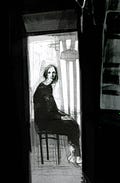* * *
Who can say how a quiet, drinking woman lives with her child, invisible to all in a one-room apartment. How she puts together her daughter's things for kindergarten every evening, no matter how drunk she is, so that everything is at hand in the morning.
She herself has traces of former beauty on her face – arches of eyebrows, a fine nose, but the daughter is a sluggish, biggish, pale girl, not even like her father, because her father is a bright blond with bright red lips. The daughter usually plays quietly on the floor while the mother drinks at the table or lying on the couch. Then they both go to bed, turn off the lights, and in the morning, they get up as if nothing had happened and run in the cold, in the dark, to kindergarten.
Several times a year, mother and daughter go out to visit, sit at the table, and then the mother perks up, begins to talk loudly and supports her chin with one hand and turns around, that is, pretends that she belongs here. She did belong, while the blond was her husband, and then everything broke up, all her past life and all her past acquaintances. Now she’s to choose those houses and those days on which the bright blond does not go to visit with his new wife, a woman, they say, of a tough character, who does not cut anyone no slack.
And so, the mother gingerly calls and congratulates someone on their birthday, drags time, fumbles, mumbles, asks how life is going, but she herself does not say that she will come: she is waiting. She waits until everything is resolved there, at the other end of the telephone line, and finally hangs up and runs to the grocery store for yet another bottle, and then to the kindergarten for her daughter.
It used to happen that until the daughter fell asleep, there was no talk of any bottle, and then everything simplified somehow, everything went by itself, because what does it matter to the girl whether the mother drinks tea or medicine. The girl really doesn't mind, she quietly plays on the floor with her old toys, and no one in the world knows how they live together and how the mother calculates and short-changes, and decides that there is no harm done if the same amount of money that would be spent on lunch goes to be spent on wine - the girl is fed in kindergarten, and she herself does not need anything.
And they economize, turn off the lights, go to bed at nine o'clock, and no one knows what divine dreams the daughter and mother have, no one knows how they touch their heads to the pillow and immediately fall asleep in order to return to the country they will leave again early in the morning, to run down the dark, frosty street, somewhere and for some reason, whereas it would be better to never wake up.
Lyudmila Petrushevskaya***********
*Far it be from me to even attempt to describe significance and influence of Lyudmila Petrushevskaya, in contemporary literature.
(even though they, and by “they” I mean various teachers, did think I should do something literary. A writer, a literary critic, a translator. Either this-or to become a defence lawyer.
As you can see I became neither)
**But I can tell you that long, long time ago, in early nineties, I stumbled upon a book with some of her stories and novellas in a somewhat unexpected place-our university library in Mount Scopus, Jerusalem.
I still remember taking it, reading it, re-reading it, then running to a store to buy two copies-for myself, and for my friend, I didn’t have money for food back then, often, so you can easily deduct her significance for me, which only grew and grew since.
***So when a few years ago, I saw a couple of thin books with her collected stories, at last translated to English, on Amazon-of course I had to get them, and re-read, just to make sure it was a fine enough translation.
It was, mostly, even very fine)-yet sometimes I thought in some sort of despair-a sort that no one needs -“oh no, so much is lost! so much is lost!”
****It was a very humbling experience, thus, to at last try and translate a story of hers myself-and I picked a very short and relatively very simple one, and yes, so much is lost.
Yet I hope-so much is found too.
At least for me-and you know, я тоже человек.
*****Here I wanted to insert an incredibly funny anecdote about a famous Russian literary critic, but I don’t want to ruin something, in case there’s something to ruin.
Give me a sign if you want me to, though.
Yours,
Chen alias April
*******
PS I’ve no idea whether one has a right to translate works of living authors without their explicit permissions (even though how it differs from poems and songs? yet still), so if you do-please tell me?
And as for Lyudmila Petrushevskaya-I hope she never dies.



Hi Chen, I don't know the original Russian text by Petrushevskaya, but this work of yours reads really well, flows naturally, doesn't sound "forced." A very good job, I reckon, well done! As for the author's permission, you published your translation on here, so it hasn't been made for commercial purposes (even if you have paid subscribers), and I think it would be fine with Petrushevskaya. If anything, more people will know her work. This story's heartbreaking, by the way, but written beautifully. And, obvs, I want to read the funny anecdote about the literary critic.
-and a huge thank you for sharing it, Portia 💫